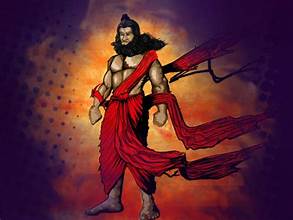Lord Parashurama is the sixth avatar of Lord Vishnu in Hindu mythology. He is revered as a warrior sage, known for wielding an axe. The name “Parashurama” is derived from “Parasu” (axe) and “Rama” (Lord Rama or Vishnu), meaning “Rama with the axe”.
He was born to the sage Jamadagni and his wife Renuka. Parashurama is often depicted as a protector of dharma (righteousness) and is associated with various legendary conflicts, particularly against the warrior class (Kshatriyas). He is believed to be immortal and one of the Chiranjivi, living until the end of the current era (Kali Yuga)
The story of Lord Parashurama
lord Parashurama

The story of Lord Parashurama, the sixth avatar of Lord Vishnu, begins with his birth to the sage Jamadagni and his wife Renuka. Parashurama was raised as a warrior sage and possessed extraordinary skills in combat. One of the notable episodes from his life involves his conflict with the Kshatriya (warrior) class, particularly with Kartavirya Arjuna, who unjustly harassed his family. In retaliation, Parashurama annihilated the Kshatriya clan twenty-one times, upholding dharma (righteousness) and protecting the Brahmin (priestly) class.
His journey is also marked by his dedication to his father and adherence to principles of humility and righteousness. Parashurama is known for wielding an axe, symbolizing his role as a warrior. Despite his prowess, he is revered for his simplicity and self-discipline.
Parashurama’s story highlights the eternal struggle between good and evil, and his legacy continues to inspire devotion and reverence among followers of Hinduism.
Is Parashurama considered immortal?
Yes, according to Hindu mythology, Parashurama is believed to be immortal. He is one of the Chiranjivi, or the “immortals” who are said to live until the end of the current Kali Yuga.
Some temples dedicated to Lord Parashurama
There are several temples dedicated to Lord Parashurama across India, including the Parashurama Temple in Kerala, the Parashurama Temple in Maharashtra, and the Parashurama Temple in Karnataka

What are the teachings or lessons from Lord Parashurama’s life
The life of Lord Parashurama offers several important teachings:
- Dedication to Parents: Parashurama’s unwavering loyalty and obedience to his father, Sage Jamadagni, exemplify the importance of honoring and respecting parents.
- Adherence to Dharma: Parashurama’s actions were guided by principles of righteousness (dharma). He fought against injustice and upheld moral values, even at great personal cost.
- Humility Despite Power: Despite being a formidable warrior with extraordinary abilities, Parashurama remained humble and disciplined. His humility serves as a reminder that true strength lies in modesty and self-restraint.
- Use of Strength for Protection: Parashurama utilized his strength and skills not for personal gain or aggression but to protect the weak, uphold justice, and preserve order in society.
- Acceptance of Divine Will: Despite facing numerous challenges and tests in his life, Parashurama accepted them as part of his divine destiny, demonstrating resilience, faith, and surrender to higher powers. https://en.wikipedia.org/wiki/Parshuram_Temple,_Chiplun
- Duty and Loyalty: Parashurama exemplifies unwavering loyalty to his father, Sage Jamadagni, and fulfills his duty as a son even in the face of great adversity.
- Humility and Self-Discipline: Despite his exceptional prowess as a warrior, Parashurama remains humble and disciplined, emphasizing the value of humility and self-control.
- Protection of the Weak: Parashurama’s actions reflect his commitment to protecting the innocent and ensuring justice, teaching us the importance of standing up for those who are vulnerable.
- Detachment from Materialism: His renunciation of material wealth and power highlights the transient nature of worldly possessions and emphasizes the pursuit of spiritual fulfillment.
Overall, the teachings from Lord Parashurama’s life emphasize the importance of duty, righteousness, humility, and devotion to principles of justice and truth. The life of Lord Parashurama teaches us valuable lessons about righteousness, humility, and devotion to duty, inspiring us to lead lives guided by moral values and compassion.
Is there any significance of Lord Parashurama in other cultures?

While Lord Parashurama is primarily revered within Hinduism, his story and character have also influenced various cultural aspects in regions where Hinduism has had an impact. Here are a few instances of his significance outside Hinduism:
- Cultural Influence: Parashurama’s tales have permeated cultural narratives beyond Hinduism, influencing art, literature, and folklore in South Asian countries where Hindu culture has spread.
- Cross-Cultural Epics: His character occasionally appears in adaptations or retellings of epics and legends in neighboring cultures, such as Jainism and Buddhism, often symbolizing themes of righteousness, valor, and the eternal struggle between good and evil.
- Interfaith Connections: Parashurama’s stories sometimes intersect with narratives in other religious traditions, fostering dialogue and connections between Hinduism and other faiths.
- Symbolism in Martial Traditions: Some martial arts traditions, particularly in regions influenced by Hindu culture, incorporate symbols or stories related to Parashurama, reflecting his status as a warrior sage and his mastery of combat.
While his significance may vary across cultures, the enduring appeal of Parashurama’s character lies in his embodiment of virtues such as courage, righteousness, and devotion, which resonate with people regardless of religious or cultural backgrounds.






